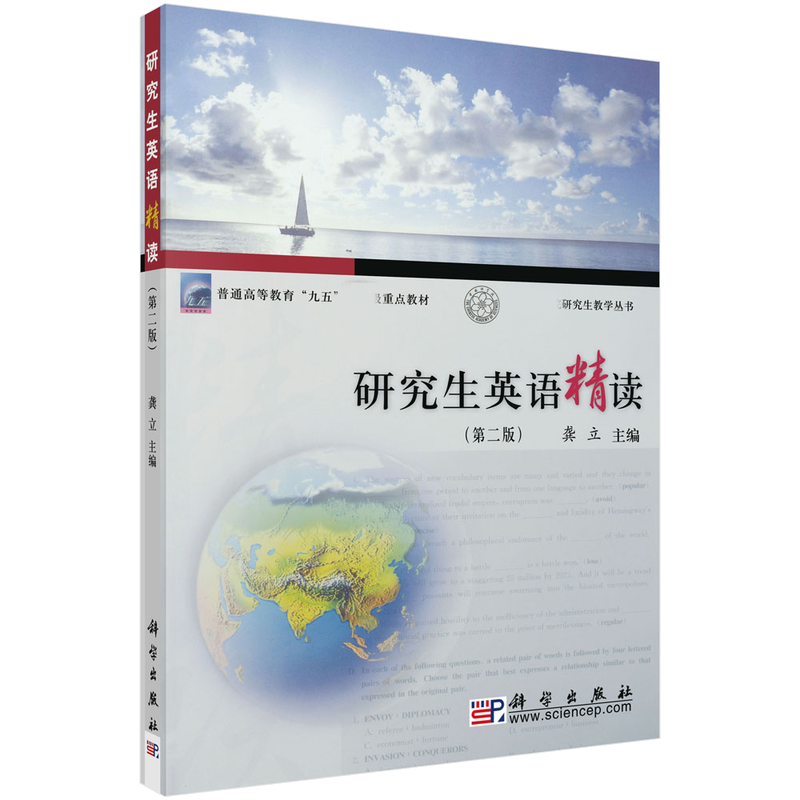
出版社: 科学
原售价: 49.80
折扣价: 37.90
折扣购买: 研究生英语精读(第2版普通高等教育九五国家级重点教材)/中国科学院研究生教学丛书
ISBN: 9787030189165

Lesson 1 ENGLISH—A WORLD LANGUAGE Susanna McBee
English has become to the ancients, dominating the planet technology, commerce, tourism, modem world whae Latin was to the as the medium of exchange in science, diplomacy and pop culture.
Pre-reading questions:
Languages are not static but in a constant state of change.What do you know about the development of the English Language ?
Ovrr 400 million people use English as mother tongue in the world today.How many people speak English, to some degree, as a foreign language ?
If you hold the viewpoint that English has become the most important language on this planet, how will you back up your argument?
Reader's Notes
It began as a rude tongue spoken by obscure Germanic tribes2 who invaded England in oared warships at the onset of the Dark Ages3.Today, 1,500 years later, the English language encompasses the globe.
When an Argentine pilot lands his airliner in Turkey, he and the ground controller talk in English.
When German physicists want to alert the international scientific community to a new discovery, they publish their findings in English-language journals.
When Japanese executives cut deals with Scandinavian entrepreneurs ln Bangkok, they communicate in English.
When the Soviet Union wants to make a propaganda point in the Mideast, it uses English not Russian.
When pop singers from Hong Kong to Heidelberg ring out their songs, the lyrics often as not are in English.
English has become to the modern world what Latin1 was to the ancients, dominating the planet as the medium of exchange in science, technology, commerce, tourism, diplomacy and pop culture.Indeed, so wide is its sweep that 345 million people use English as their first language and an additional 400 million as their second.“It’s really amazing that one dialect spoken in one small place has become so important around the world, says Donald Bowen, professor of English at the University of California at Los Angeles.
Initially, the language spread with the British Empire.After World War II, English with a twist—American jargon—circled the globe, boosted by U.S.economic and political power.Finally, the language captured the lead in the knowledge explosion: English is the medium for 80 percent of information stored in computers around the world.
Inevitable as “English creep” seems to be, it often bumps into walls of opposition.Some Third World countries have banned it or restricted its use, denouncing it as a weapon of “cultural imperialism.”
But English marches on.“If you need it, you learn it, ” says one expert.Ambitious people in many countries are scrambling to do just that.The demand for English language broadcasts, texts and other materials has created rich markets.Yet the United States seems barely aware of them, and Britain has captured a firm lead in many areas.Warns one book publisher, Chairman Leo Albert of Prentice-Hall International, “This is a battle for people’s minds, and we are lagging far behind the British.”
After the new language came to England with Germanic tribes in the fifth century, it was augmented by the Scandinavian words of the Vikings in the ninth century and infused with the French of the Norman conquerors after 1066.Still, as recently as 400 years ago, many Britons would not have bet a plugged tuppence on the future of their language, bright and lively though it was.In 1 582 a scholar named Richard Mulcaster wrote, “The English tongue is of small account, stretching no further than this island of ours, nay not there over all.”
Little did he realize that in just 25 years, with the settlement of Virginia', the language would make a transoceanic leap from which it would never retreat.
In the early colonial days, 5 million people spoke English.
By the 1930s, after centuries of empire building and population growth, the number had jumped to 200 million.By the mid-1960s, after the postwar business and baby booms, the figure had vaulted again to an estimated 400 million, counting those who used English as a second language.Now, with the total near 750 million, one of every 7 people in the world claims some 15 knowledge of English.
More speak Chinese—one billion people—but use of Chinese outside its populous homeland or ethnic enclaves in other countries is rare; 250 million Chinese, in fact, are learning English today— more than the number who speak it in the United States.
English is the native language of 12 countries and an official or semiofficial tongue in 33 others where it is used to conduct at least some government business.Further, it is either a required subject or one widely studied in the schools of at least 56 additional countries.
It is not only the language of aviation but with a new British-issued set of maritime terms called “Seaspeak, it may become the official language of shipping.
Millions of people overseas struggle daily to master the ir